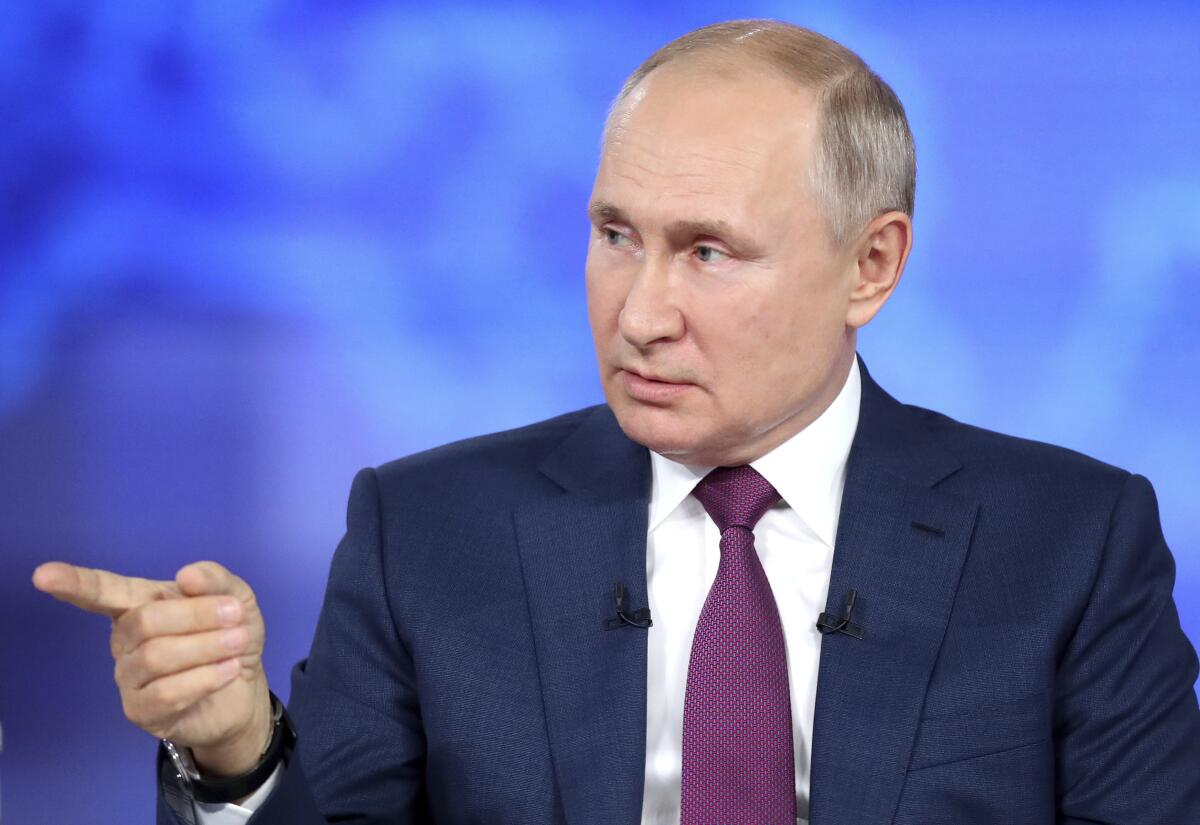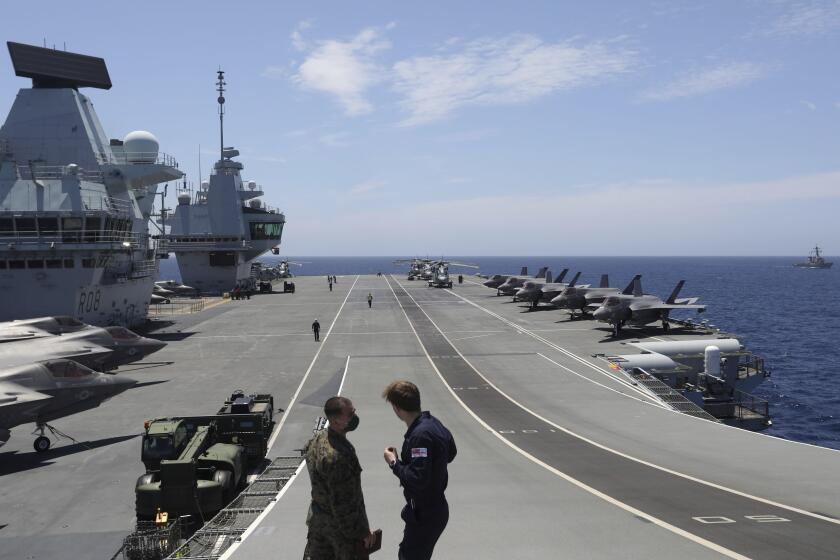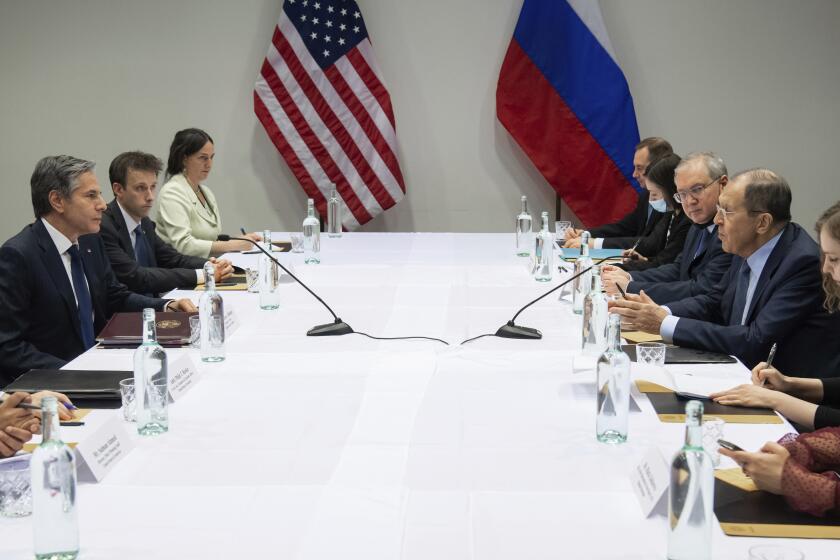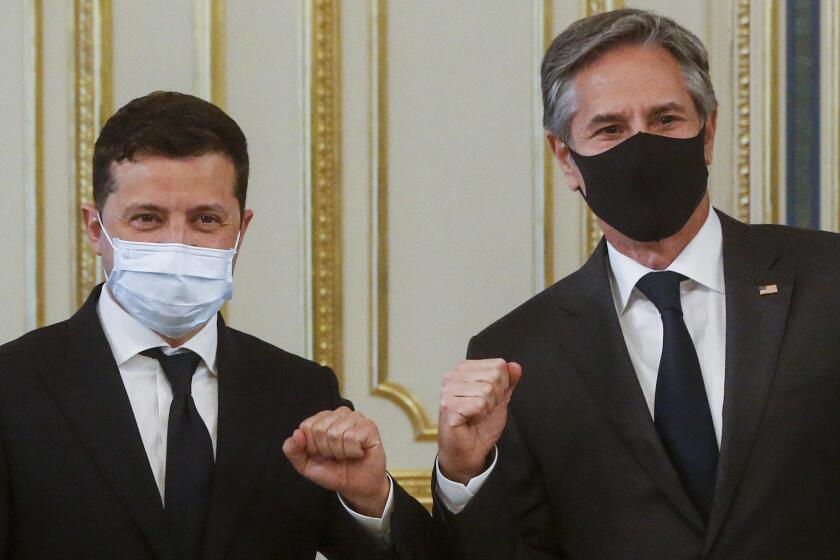Putin accuses U.S. and Britain of being behind Black Sea ‘provocation’

- Share via
MOSCOW — Russian President Vladimir Putin said Wednesday that a U.S. reconnaissance aircraft was operating in sync with a British destroyer last week when the ship sailed through the Black Sea in what he described as a “provocation” to test Moscow’s response.
Moscow said one of its warships fired warning shots and a warplane dropped bombs in the path of Britain’s HMS Defender on June 23 to force it from an area near Crimea that Moscow claims as its territorial waters. Britain insisted that its ship wasn’t fired upon and said it was sailing in Ukrainian waters.
The episode was the latest to raise tensions between Russia and the West since Russia’s annexation of Ukraine’s Crimean Peninsula in 2014, a move not recognized by most countries but one that gives Russia access to a long Black Sea coastline.
The U.S. Defense Department had no immediate comment Wednesday on Putin’s claim that one of its aircraft was with the British ship last week.
Asked if the events could have triggered World War III, Putin responded that the West wouldn’t risk a full-scale conflict.
“Even if we sank that ship, it wouldn’t put the world on the brink of World War III because those who do it know that they can’t emerge as winners in that war, and it’s very important,” Putin said during his annual live call-in show, during which Russians ask him questions.
NATO troops, warships and aircraft are taking part in massive military exercises stretching across the Atlantic as tensions with Russia rise.
Russian officials have warned that if a Western warship enters the waters again, the military could fire to hit. Since it annexed Crimea, Russia has chafed at NATO warships visiting the area, calling it destabilizing.
Britain insists that the Defender was making a routine journey via an internationally recognized travel lane and remained in Ukrainian waters. Britain, like most of the world, recognizes Crimea as part of Ukraine despite the peninsula’s annexation by Russia.
Putin said the U.S. reconnaissance plane’s apparent mission was to monitor the Russian military’s response to the Defender’s presence.
“It was clearly a provocation, a complex one involving not only the British but also the Americans,” he said, adding that Moscow was aware of the U.S.’ intentions and had responded accordingly to avoid revealing sensitive data.
As climate change transforms the Arctic, Russia moves its military in. Secretary of State Blinken raises objections in first meeting with Russian counterpart.
The Russian leader lamented that the move closely followed his summit with President Biden in Geneva. “Why would they make such provocations?” he said.
Putin insisted that Russia would firmly defend its territory.
“We are fighting for ourselves and our future on our own territory,” he said. “It’s not us who traveled thousands of kilometers to come to them; it’s them who have come to our borders and violated our territorial waters.”
Putin emphasized that Moscow was concerned about NATO troops coming to Ukraine for training, reaffirming that a permanent Western military presence on the Ukrainian territory would challenge Russia’s vital interests and represent a red line.
Secretary of State Blinken in Ukraine to assure President Zelensky, who played role in Trump impeachment, of U.S. support against Russian hostilities.
He also reiterated, as he often does, that there was a close kinship between the Russian and Ukrainian peoples, but accused Ukraine’s leadership of being hostile towards Russia. Putin expressed doubt about the value of a meeting with Ukrainian President Volodymyr Zelensky, describing him as a Western pawn.
“Why meet Zelensky if he has put his country under full foreign control and key issues for Ukraine are decided not in Kyiv but in Washington and, to a certain extent, Paris and Berlin?” Putin asked.
Earlier this year, Russia beefed up its forces near Ukraine and warned Kyiv that it could intervene if Kyiv tried to use force to reclaim areas in eastern Ukraine that are controlled by Russia-backed separatists since conflict erupted there in 2014. Moscow later pulled back some of its troops, but the Ukrainian authorities said that the bulk of them have remained close to the border.
More to Read
Sign up for Essential California
The most important California stories and recommendations in your inbox every morning.
You may occasionally receive promotional content from the Los Angeles Times.













